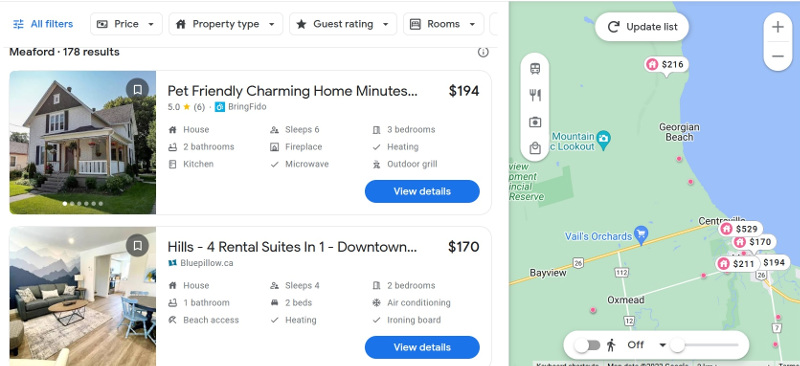Members of Meaford’s council have often noted that during the 2022 municipal election campaign, the number one issue they heard from voters was the need to regulate short-term rentals. As a result council has been hoping to implement a bylaw from the beginning of their term, identifying the issue as one of their top priorities. Two years later, staff turnover has resulted in delays for council’s plan, and though council had been hopeful to have had a bylaw in place quickly, it will now be some time in 2025 before a bylaw is in place.
A staff report presented to council during their November 4 meeting offered three options for council to consider. The report, authored by recently hired Director of Economic Development Eric Baldwin, recommended three options: to maintain the status quo, to direct staff to track records of bylaw complaints and to work with short-term accommodation platforms to resolve issues. The third option provided to council in the report presented on Monday was to direct staff to “create a return on investment cost analysis for a short-term accommodation licensing registry and by-law for the Municipality of Meaford. The required components of the licensing program including software purchase(s); process mapping; service level adoption; new staffing allocation in Fire Prevention, Building Inspections, Business Licensing, By-Law Enforcement; create a Short-Term Accommodation Licensing Committee, and all other necessary to launch the program.”
Council did not appear satisfied with any of the three options provided by staff, however, after an hour-long discussion, council unanimously approved an amendment to the third option adding direction for the program to recover costs to ensure the program is revenue neutral.
Staff’s November 4 report to council suggested that the implementation of a short-term accommodations bylaw and regulatory framework would be costly, with staff estimating that such a program would cost Meaford ratepayers roughly $500,000 per year.
“The third option is to cost the creation of a comprehensive STA licensing program. This approach would provide a detailed and structured framework for managing short-term rentals and would involve increased administrative efforts, significant costs, and considerable commitment of resources for development, management, and enforcement,” staff noted in their report.
During the public participation portion of Monday’s council meeting, one resident suggested that the municipality could charge fees of $2,000 per year for the estimated 232 short term rental properties located within the municipality to cover the cost of the program, rather than the $276.75 suggested in staff’s report to council.
Deputy Mayor Shirley Keaveney made clear to staff that a short-term accommodations bylaw remains a top priority of council.
“We’ve been looking forward to this discussion for a long time,” Keaveney told council. “The budget framework was above this in our agenda, and I got that far and was in shock, and recognizing that we are facing a nearly 21 percent increase that we can’t do very much about, and then coming to this one, and seeing the expense of it, I was in an immediate state of ‘no way, we can’t do this this year’, but after a couple of days I got my feet back on the ground. Certainly during the last election time frame, as has been referenced today, that this was, again, the number one issue that was brought forward during that time period. We did as a council make that a priority, so I think to honour our strategic priorities, we have to go forward, and we have to deal with a bylaw, and recognize it’s going to take some time, but I am hoping we can minimize the delays as much as we can recognizing the great work that’s been done in other communities.”
While not declared in the report, both Meaford’s CAO and its Director of Economic Development, who authored the report to council, operate short-term rentals themselves. Asked if she was concerned about the perception of conflict, Deputy Mayor Shirley Keaveney told The Independent that she had no concerns.
“My position is that our CAO has demonstrated complete professionalism in presenting options to council for next steps with a potential STR Bylaw. Kymm’s integrity has not come into question in any way even though she and her husband operate an Airbnb locally. My conversations with CAO Buckham on this matter have shown no bias whatsoever. Council will make this decision and I’m confident any additional information Kymm provides on Monday will exemplify her high morals and strong leadership,” Keaveney told The Independent last week. “Director Baldwin has provided council three options, the decision will be made by council. I have no reason to challenge Eric’s intentions or integrity considering the variances in the choices before council. The report speaks clearly to the costs of a fulsome bylaw and to the number of complaints received. Council will have to weigh the advantages and disadvantages of such an investment. I have not experienced any evidence of bias during my conversations with Eric on this matter nor do I sense the same in the factual language of the report.”
The road toward establishing a short-term accommodation bylaw has been lengthy, in spite of council’s openly expressed desire to have had a bylaw in place within the first year of their term.
In June of 2023, council took the first steps toward regulating short-term rentals, and gave direction to municipal staff to explore the regulations and licensing bylaws that have been established by other municipalities to use as a framework for the Municipality of Meaford. Council also directed staff to limit the number of public input meetings to one, as they hoped to have a bylaw in place before the end of the year.
Sixty-eight Meaford residents attended four two-hour public engagement sessions that were held at Meaford Hall on October 24, 2023. In addition to the public engagement sessions, a questionnaire was made available from mid-October through early November, which garnered 501 responses. Staff also reviewed correspondence sent to the Municipality relating to short-term accommodations.
The public engagement identified a number of concerns both from residents and short-term rental property owners, which helped staff to prepare a 24-page stage two report presented to council on December 11, 2023, and to develop recommendations for council’s consideration.
In December of last year, it appeared that the Municipality of Meaford was on the verge of implementing a framework for regulating short-term rentals, after having voted to direct staff to “develop a licensing bylaw, licensing program, and enforcement program aimed at addressing negative impacts that can be experienced by neighbouring property owners, noting six specific areas of focus: on-site parking, availability of STA site manager to address issues, occupancy limits, basic fire safety provision, infraction reporting mechanisms, and availability of municipal enforcement officers during evenings and weekends.” However, nearly a year later, council is still waiting for a regulatory framework and bylaw to be developed and implemented.
After council’s decision on November 4, staff has now been directed to create a return on investment cost analysis for a short-term accommodation licensing registry and by-law for the Municipality of Meaford, and to work toward establishing a revenue neutral regulatory framework.












